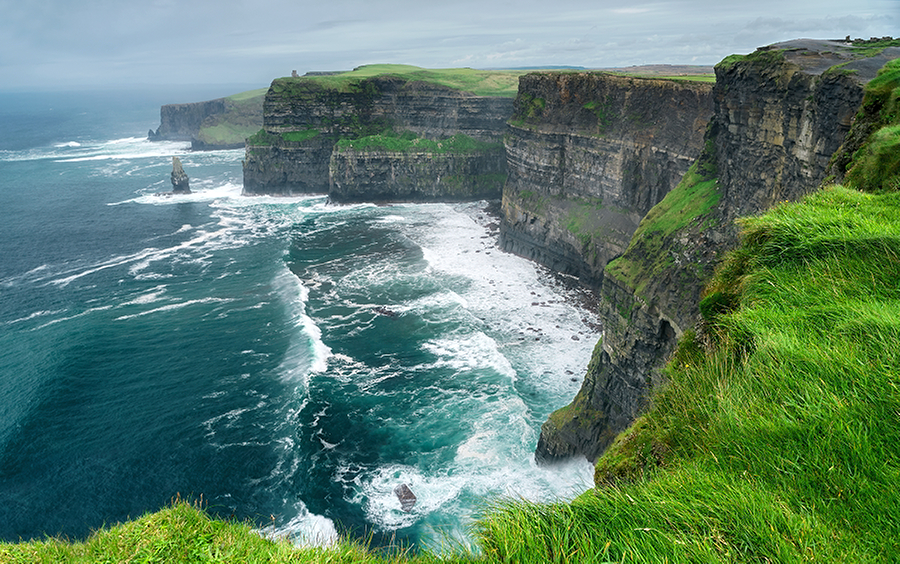Contributed By: The Travel Institute
Ireland is a perennial top-selling destination, so, over the next few months, The Travel Institute is highlighting this fascinating country.
In this first of a three-part series, we want to inspire you to discover the beauty of western Ireland and the world’s longest defined coastal touring route, The Wild Atlantic Way. This region is covered more in depth in our Northern Europe Destination Specialist Course.
Evan McElligott, CTA–Owner of Independent Ireland, which specializes in customized FITs and small groups–and a Travel Institute professional educator, is sharing his in-depth knowledge of Ireland with you. This is what Evan has to say about The Wild Atlantic Way:
County Clare on Ireland’s west coast is a region of rich green farmland and rolling hills through which the River Shannon flows. Within an hour’s drive west of Shannon International Airport is an area of starkly beautiful scenery. And, while the majestic Cliffs of Moher attract many visitors, few allow time to explore the unique landscape of the nearby Burren region. With its unique lunar-like landscape and its rare flora and fauna, this area is well worth further exploration.
Nearby Limerick has been center stage in many battles that took place in Ireland. Native residents of Ireland fought the invading Vikings for several years until Brian Boru’s armies conquered the Norsemen in 1014. At the turn of the 17th century, the Treaty of Limerick guaranteed religious freedom for Irish Catholics.
Limerick’s noteworthy sites include the 13th-century Norman structure King John’s Castle, built to guard the Shannon region of the country; the Treaty Stone, on the River Shannon, just across from King John’s Castle, the spot where the Treaty of Limerick was believed to be signed; the Romanesque Saint Mary’s Cathedral, the oldest building in Limerick, founded in 1168; and the Hunt Museum, which holds a fine collection of relics of the Bronze Age, as well as treasures of the Celtic and Medieval ages.
Just south of Limerick, an important port on the River Shannon, is Adare—widely considered the prettiest village in Ireland, replete with thatched-roof cottages and lovely gardens. Bunratty Folk Park, midway between Limerick and Ennis, depicts Irish life over the last five centuries, while the adjacent Bunratty Castle is a popular setting for medieval banquets.
Also south of Limerick—around a small, horseshoe-shaped lake—are artefacts of Stone Age Ireland found at the Grange Stone Circle. Burial mounds and more than 100 stones of the ancient stone circle remain. In the historic town of Kilmallock is King’s Castle, a 15th-century tower house.
The attractive city of Galway, with its floral hanging baskets and hand-painted wooden shop signs, is an ideal base for touring the pastoral scenery of the Connemara region, the Aran Islands, and the coast of County Galway. Galway originated as a small fishing village nearly a thousand years ago. The Anglo-Normans built sturdy walls around the village, Claddagh, in 1270. Fire destroyed much of the town in 1473, but new stone buildings were erected in the 16th and 17th centuries.
Galway is famous for its seafood, especially during the Galway International Oyster and Seafood Festival, and for plays at the Galway Theater. A huge draw to Galway this year is that it is hosting the European Capital of Culture for 2020. Galway’s cultural program motto is “Let the Magic In” and will highlight language, landscape, and migration. Consequently, the city will be bustling with myriad cultural events. Galway also hosts one of Ireland’s best horse racing events at the end of July. In addition, the city boasts sites like Kennedy Park, with its sculptures and bronze cannons; Lynch’s Castle, a prime example of a 16th-century fortified house, complete with gargoyles and ornamental cornices adorning its exterior; and the 12th-century Collegiate Church of St. Nicholas of Myra, which is the largest medieval parish church in Ireland.
From Galway, there are ferries to the Aran Islands, a group of rugged limestone islands where most of the inhabitants speak Gaelic and make their living from the land or sea. On Inishmore, the largest of the islands, is Dun Aengus, one of the finest prehistoric monuments in Europe, a limestone fort perched on a 300-foot cliff above the sea. The island, along with the slightly smaller islands of Inishmaan and Inisheer, is also worth exploring for its secluded coves and meadows of wildflowers. There are places to shop for thick, hand-knitted Aran sweaters designed to ward off the Atlantic chill.
North of Galway is the Connemara region, a stunning, sparsely populated patchwork of bogs, secluded valleys, shimmering lakes, and mountains. Any visit here should include the Cottage and Visitor Centre of writer, educator, and leader of the 1916 Rising, Patrick Pearse.
Another prime attraction is Aughnanure Castle, outside the village of Rosscahill, a 16th-century stone tower dramatically situated on the River Drimmen. This six-story tower was the home of the Fighting O’Flaherty family, which was famous for fending off the Normans.
South of Galway, Dunguaire Castle is in excellent condition, with each floor depicting a particular period in the area’s history.
Thank you, Evan!
To learn more about the Republic of Ireland, enroll in The Institute’s Northern Europe Destination Specialist Course, comprising Scandinavia and The British Isles. The Northern Europe course is the first release in a new, multi-part Europe series designed to educate agents about the region using an in-depth, comprehensive overview designed to enable additional sales.
A collaborative industry effort created in 1964, The Travel Institute® has continuously evolved to maintain its role as the global leader in industry education and certification while staying true to its mission: dedicated solely to advancing the professionalism of both agents and industry leaders. A trusted partner to industry suppliers and educational institutions, The Travel Institute has educated hundreds of thousands of travel professionals through its programs. Throughout North America, many successful agents and high-profile leaders credit their success to coursework from The Travel Institute.



